Harlequin F.C.
The Harlequin Football Club (Harlequins or Quins for short) is an English rugby union team that plays in the top level of English rugby, the English Premiership. Their ground in London is the Twickenham Stoop. They were one of the founding members of the RFU.
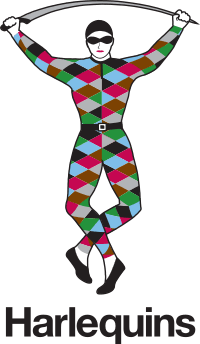 | ||
| Full name | Harlequin Football Club | |
|---|---|---|
| Union | Middlesex RFU | |
| Nickname(s) | Quins | |
| Founded | 1866 | |
| Location | Twickenham, London, England | |
| Ground(s) | Twickenham Stoop (Capacity: 14,800) | |
| Chairman | David Morgan | |
| CEO | Laurie Dalrymple | |
| Director of Rugby | Paul Gustard (Head of Rugby) Billy Millard (General Manager (Rugby)) | |
| Coach(es) | Mark Mapletoft | |
| Captain(s) | Chris Robshaw | |
| League(s) | English Premiership | |
| 2018-19 | 5th | |
| ||
| Official website | ||
| www | ||
Quins were crowned winners of the European Challenge Cup in 2011,[1] the English Premiership for the first time in 2012 and won the Anglo-Welsh Cup in 2013.
The current club captain is Chris Robshaw while the current Head of Rugby is former England defence coach Paul Gustard, with Billy Millard acting as the Club's General Manager.
For sponsorship reasons they were formerly known as NEC Harlequins, but principal sponsorship is currently held by DHL and Adidas.[2]
History
Formation and early years

The Hampstead Football Club was founded in 1866 and the first recorded game took place in 1867. A disagreement between Club Secretary William Titchener and William Alford in 1867 resulted in Alford leaving with half of the membership to form the club now known as Wasps.[3] The club was renamed Harlequin Rugby Football Club in 1870, supposedly because the membership was no longer purely local, but the HFC monogram had to be retained. The word 'Harlequin' (Arlecchino, a comic servant from the commedia dell'arte) was found in a dictionary and all present agreed to the new name.[4][5]
During its first 40 years the club played at a total of 15 venues. Since 1909, they have only played at three.
In 1906, the club was invited by the Rugby Football Union to use the new national stadium in Twickenham. In those early days, only one or two internationals were played there during the season, and before long Twickenham became the headquarters of the Harlequin Football Club.
1961, first East Africa tour
In 1961, Harlequins undertook a tour of East Africa in conjunction with Pretoria Harlequins from South Africa, as guests of the Kenya Harlequin F.C. and the Rugby Football Union of East Africa; the club won five and drew one. The tour is notable for two facts, it was the first time that three sister clubs of the Harlequin family all played each other in a coordinated series of matches and at 19 days it was the longest overseas tour undertaken by a British club up to that time. Despite this, the tour pales to insignificance when it is realised the Pretoria club spent four weeks in East Africa playing eight matches and another in Rhodesia on the way home.
The London club arrived at Entebbe airport at dawn on 4 May and opened their tour with a 44–13 win against Uganda in Kampala on 6 May. They played West Kenya Province at Kitale (winning 24–6), and the Pretoria Harlequins on Saturday 13 May at the RFUEA ground, Nairobi (winning 13 – 11). The next two matches were played at the same location, beating the host club 16–0 the next day and earning a 9-all tie against Kenya Central Province on Wednesday 17 May. The last match for the London club was against Kenya at Nakuru on Saturday 20 May (winning 8–0). This last match was played under a typical "long-rains" shower that, though heavy, did not soften the hard ground enough to be a problem.
Acquisition of The Stoop
In 1963, Harlequin acquired an athletics ground with 14 acres (57,000 m²) just over the road from the Twickenham ground, which became its training pitch. This subsequently become their home: the Stoop Memorial Ground which in 2005 was renamed The Twickenham Stoop. This is named after Adrian Dura Stoop, who won 15 caps for England and is said to have been the person who developed modern back play.
League rugby and the professional era
With the introduction of leagues in 1987 bringing a more competitive environment, Harlequins maintained their status in the Premier Division as one of England's top 12 clubs until 2005.
The club has won the Rugby Football Union clubs knockout competition on two occasions: the John Player Cup in 1988 and Pilkington Cup in 1991. In addition, they played in the finals of 1992, 1993 and 2001.
Harlequins hold the world record for providing the most players from one club (8) in a Rugby World Cup final. In the second ever RWC final at Twickenham in November 1991, seven Harlequin players appeared for England (Will Carling, Simon Halliday, Jason Leonard, Brian Moore, Paul Ackford, Mickey Skinner, Peter Winterbottom) and Troy Coker played in the Australian pack.
They are also affiliated with an amateur team, Harlequin Amateurs.
Harlequins became the first British team to win the European Shield in 2001, defeating Narbonne 42–33 in the final. They then became the first team to win the tournament twice, defeating Montferrand 27–26 in the final of the renamed Parker Pen Challenge Cup on 22 May 2004.
In 2005 they were relegated to National Division One after finishing at the bottom of the Zurich Premiership. In July of that year they announced that they would be establishing a partnership with rugby league club London Broncos, which saw the two clubs sharing Harlequins home ground of The Stoop from the start of the 2006 Super League season. As part of the deal, the Broncos changed their name to Harlequins RL, though the two clubs remain under separate ownership.
In 2005–06, Quins utterly dominated National Division One. They won 25 of their 26 league matches, including their first 19, losing only at Exeter Chiefs on 25 February 2006. Quins also averaged nearly 40 points per match, scored four or more tries in 20 matches, and racked up an average victory margin of slightly over 25 points. They secured their return to the Premiership on 1 April with four matches to spare, crushing Sedgley Park 65–8 while the only team with a mathematical chance of pipping them for the title, Bedford, lost 26–23 at Exeter.
For the 2008 tour to New Zealand, England coach Martin Johnson selected four Harlequin players to play for the tour, Nick Easter, David Strettle, Mike Brown and Danny Care. Also five Harlequin players were selected for the England Saxons Barclays Churchill Cup matches to the United States and Canada. Tom Guest, Chris Robshaw, Adrian Jarvis, Ugo Monye and Will Skinner were all selected with Will Skinner chosen as captain for the side.

2007–08 season
Chris Robshaw played a leading role in the 2007–08 season as Harlequins won 12 of their 22 Guinness Premiership matches and finished 6th in the league. Harlequins got off to a shaky start which saw them be in 2nd, 3rd 4th place consecutively, and during the latter half of the season Halequins managed to reach 3rd after a string of 7 out of 9 wins, but three defeats from London Irish, Sale Sharks and Leicester Tigers to finish the season meant that Quins dropped to 6th and missed out on the play-offs.
Two Harlequins players were short-listed for awards, Danny Care and Chris Robshaw, were short-listed for the Land Rover Discovery of the Season award. As well as Coach Dean Richards being short-listed for the O2 Director of Rugby of the Season as well as Tom Guest being nominated for MBNA Try of the Season for his try against Leeds Carnegie on Sunday 13 April 2008.
2008–09 season
Players to leave Quins at the end of the 2007–08 season were Adrian Jarvis, Hal Luscombe, Chris Hala'ufia, Paul Volley, Nicholas Spanghero, Simon Keogh, Ricky Nebbett and Ryan Manyika. For the 2008–09 season Quins signed five new players; London Irish centre Gonzalo Tiesi, Ulster Back-row forward Neil McMillan, Auckland Blues fly-half Nick Evans, Tongan international Epi Taione who plays on wing, centre and back row and Fijian utility back Waisea Luveniyali.
Quins finished second in the 2008-09 Guinness Premiership table. In the play-offs, they lost 0–17 at home to eventual losing finalists London Irish.
Quins also hosted their first "Big Game" at Twickenham over the Christmas period, playing out a 26–26 draw with Leicester Tigers in front of 52000 people.
In the 2008-09 Heineken Cup Harlequins came top of their pool, including beating Stade Français both at home (thanks to a dramatic last play drop goal from Nick Evans) and away in front of 80000 people in the Stade de France in Paris. They lost 5–6 at the Stoop to eventual tournament winners Leinster Rugby at the quarter final stage, a match in which the infamous Bloodgate Scandal took place.
2009–10 season
The contrast between this season and the previous season could hardly have been greater. With the shadow of Bloodgate still hanging over the club, the club struggled to an 8th-place finish despite retaining most of the players from their successful previous campaign. They also made a swift exit from the Heineken Cup at the group stages while failing to chalk up a single victory in the competition. Owing to the club's lower league position, they failed to qualify for the competition for the first time in three years.
Quins also hosted their second "Big Game" at Twickenham. Despite losing 20–21 to "London" Wasps, the game attracted 76000 spectators.
Following the resignation of Dean Richards in August 2009, Conor O'Shea was appointed Director of Rugby in March 2010.
2010–11 season
Harlequins endured a mixed 2010–11 season, which was characterised by inconsistency. They finished seventh in the league, which was insufficient to ensure Heineken Cup qualification. However, they proved their potential with some inspiring performances on their way to the Amlin Cup final. This included a historic win away against Munster in the semi-final, where they became only the second club to beat the Irish province at home in a European Competition. Harlequins won the final (19–18) against Stade Français to win its 3rd Amlin Cup.[6][7]
2011–2012 season
Harlequins started the season well, winning their first ten premiership games before losing to Saracens at Twickenham Stadium in "Big Game 4" in front of a then club record for a premiership crowd, consisting of 82,000. The club's results after the defeat to Saracens continued to be generally strong, with only three other defeats in the regular season and the club went on to finish top of the league. They played Northampton Saints at the Twickenham Stoop on 12 May 2012, a match which they won thanks to a 25–23 victory sealed with a try in the 77th minute by Joe Marler.[8] Harlequins beat Leicester Tigers on 26 May 2012, in the Premiership final at Twickenham Stadium to win their first Aviva Premiership title with a score of 30–23 in front of an 81,779 crowd. Tom Williams and Chris Robshaw scored the tries and Nick Evans scored 20 points through penalties and a conversion. Chris Robshaw was named man of the match.
During this season, Harlequins played in the Heineken Cup thanks to their victory in the Amlin Cup the season before. However, they lost out on a quarter final spot in the last game of the pool stage after a defeat to Connacht. Subsequently, they went into the Amlin Cup competition but were resoundingly beaten by Toulon. Harlequins also played in the LV= Cup but did not make it out of their group with two wins and two losses.
2012–2013 season
Harlequins started their 2012–2013 season with four straight wins before suffering a first setback at the hands of Saracens at home in round 5 and at Exeter Chiefs in round 6. The club then managed to stay within the first two places of the table. On 29 December Big Game 5 proved to be a success with a 26–15 win over London Irish before a capacity crowd of 82,000 at Twickenham Stadium. Later in the season, the second setback came in the return game against Exeter when the Chiefs defeated Harlequins. The slide continued as they suffered back-to-back defeats against Saracens and Gloucester. They secured their place in the play-offs, but lost to Leicester at Welford Road in the semi-final 33–16.
Having qualified for the 2012-13 Heineken Cup on the virtue of their 2012 English Premiership title, Harlequins produced a strong showing in the pool stage, remaining unbeaten in pool 3 against Biarritz Olympique, Connacht Rugby and Zebre to be granted No. 1 seed for the quarter finals. However, they lost to No. 8 seed Munster at home 12–18 in the quarter final.
The LV= Cup featured a Harlequins team stripped of its players on international duty. Relying on a team of developing players, the club remained unbeaten throughout the pool stage. Harlequins beat Bath Rugby (31–23) in the semi-final at The Stoop, and defeated and Sale Sharks (32–14) in the final at Sixways Stadium. This was Harlequins' third title in the English/Anglo-Welsh Cup and the first since the inception of the Anglo-Welsh format. This title granted Harlequins a place in the 2013-14 Heineken Cup.
2013–2014 season
Aviva Premiership
Harlequins made a disappointing start to the new season suffering two defeats in their opening two home games against Northampton and Saracens. Injuries stalled their start to the season, and they found themselves in seventh after five games. Their season did eventually improve and they did begin to challenge for a top four spot. But four consecutive away defeats set them back again. They were left in sixth place, six points behind fourth, with four games left to play. A series of several closely fought wins including a try bonus point in the penultimate game against Exeter Chiefs ensured they would face a winner takes all home tie against Bath in the final round of the regular season. A 19–16 win in this game saw them march on to a semi-final at Allianz Park having finished level on points with Bath but crucially winning one more game. Saracens won the semi-final to end Quins' hopes, beating them 31–17.
Heineken Cup and Europe
Harlequins also made a poor start in Europe suffering a 26–33 home defeat against Scarlets before being beaten at Clermont Auvergne. They replied strongly with back to back wins over Racing Metro. They lost their next home game against Clermont after they lost a 13–3 lead. They did win their last game at Scarlets to secure a place in the second tier Amlin Challenge Cup competition. They won their quarter final 29–6 at Stade Francais, but lost to Northampton Saints in the next round.
2014–2015 season
Aviva Premiership
Harlequins were inconsistent at the start of the season and won half of their opening six games before heading into Europe.
The rest of the season saw this pattern continue and Quins finished 8th.[9]
European Rugby Champions Cup
Harlequins beat Castres Olympique in the first ever European Rugby Champions Cup match before an away win at Wasps and defeating Leinster at home. However, subsequent losses away to Leinster, and then at home to Wasps ensured Harlequins finished third in their group and were knocked out of the tournament.
2015–2016 season
Aviva Premiership
The start of the 2015/16 season was delayed by the 2015 Rugby World Cup. However Harlequins made a strong start having a good first half to the season. They were in 3rd place in mid-January.
One of the highlights of the seasons was the home defeat of Saracens.[10] At that time Quins hadn't beaten Saracens for 4 years and Saracens were unbeaten in their first eight games of the season.
Following this game their form fell to pieces however. First giving away a 9-point lead at Newcastle followed by a home defeat by Northampton when fly half Ben Botica failed to kick the ball out of the play when the game had finished. It was the start of a run of 7 defeat in 9 games and after being thrashed by the Exeter Chiefs on the final day of the season 24–62, Quins failed to earn a place in the European Champions Cup, finishing 7th when they required a top six finish.
European Rugby Challenge Cup
Quins put in a very strong performance in the group stage of the Challenge Cup, topping their pool and winning all of their first five games with a bonus point. This gave them a home quarter final.[11]
They fought back from 18-30 down against London Irish to win and reach a home semi-final against Grenoble, they comfortably won that game to set up a final against Montpellier in Lyon. After their League form had left them out of the Champions Cup places they needed victory to ensure a place in the competition next season. They slipped to a 26–9 deficit and got within 7 points but Ben Botica inexplicably kicked the ball out of play on his last game before heading to Montpellier to hand his new club the title, leaving Quins as runners-up and out of the Champions Cup for a second consecutive season.
The John Kingston Era (2016-2018)
Following Conor O'Shea's departure at the end of the 2015/16 season, Quins appointed John Kingston, then head coach, as his successor. In Kingston's first season, though his side struggled to find form on the road and failed in Cup competitions, a strong run at the end of the season left Quins on the brink of European Champions Cup qualification for the first time in three seasons.
It was achieved after a bonus point away at Northampton Saints on the last day of the season secured sixth place, with the Saints themselves missing out on games won.
Despite this however, Quins headed into the 2017/18 season still with significant problems in terms of their squad depth and away form, and though they started the season no worse than they had ended the previous one, their form started to deteriorate in the new year. In spite of this, Kingston was awarded a contract extension and from there, only managed a solitary league win from January to May of the season.
They once again failed to contend in Europe, with just one win in the group stages leaving them bottom of their group.
The dreadful run included a 5-35 home defeat to London Irish, who completed the double over Quins for that season. Irish only managed one other win all season, and following the defeat, Kingston left the club by mutual consent. In his three subsequent games Quins lost 37–9, 44-13 and 41-17 to Gloucester, Worcester and Exeter respectively to end a desperately disappointing season. Quins finished 10th, only ahead of 11th placed Worcester on points difference. It was their worst season since relegation in 2004/05.
Stadium
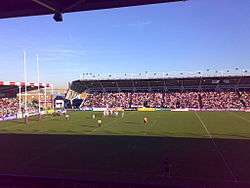
Harlequins play at the Twickenham Stoop, which is situated in Twickenham in south-west London. The stadium is named after former England international Adrian Stoop, who was a Harlequins player and later president of the club.
The club acquired the then athletics pitch in 1963, a ground of 14 acres (5.7 ha), close by to the RFU ground. It became the training pitch, and eventually, the Harlequins home ground. The site provided a ground that could be developed, and since then much has been done in terms of upgrading with a current capacity of 14,800. The stadium was known as the Stoop Memorial Ground for many years, but it was renamed the Twickenham Stoop in 2005.[12] They also play one game at Twickenham Stadium each December called the Big Game.
Harlequins Foundation
The Harlequins Foundation was set up in 2015 as an independent charity (1161838).
It delivers two flagship programmes: Switch – a women and girls project which aims to develop female leaders, and METTLE – a project that develops skills and knowledge to improve physical health and mental well-being for 9-12 year olds. The METTLE pilot was evaluated by St Mary's University and the programme was found to have had a positive impact on young people's self-confidence, wellbeing, decision making and mental resilience.[13]
In September 2018, The Harlequins Foundation and The Movember Foundation announced a long-term partnership in joint initiative committed to help rugby fans, and the wider community, address the issues around men's health and provide information and guidance on what to do when mental health suffers.[14]
The foundation delivers the Premiership Rugby Funded Programmes: Move like a Pro, Project Rugby, Tackling Health and Hitz.
Additionally the charity allocates grants to local organisations and charities in the local community.
In 2020 it was announced that The Harlequins Foundation would partner with The Duke of Edinburgh’s Award and become the only Premiership Rugby club licensed to deliver the DofE.[15]
"Bloodgate" scandal
During the quarter final of the 2009 Heineken Cup against Leinster, Harlequins wing Tom Williams came off the field with what turned out to be a faked blood injury to facilitate a tactical substitution of fly-half Nick Evans back onto the field. An investigation by the ERC and the RFU revealed that blood injuries had also been faked by Harlequins to enable tactical substitutions on four previous occasions. These findings resulted in a twelve-month ban for Williams – reduced to 4 months on appeal, a three-year ban for former director of rugby Dean Richards and a two-year ban for physiotherapist Steph Brennan as well as a £260,000 fine for the club.[16][17] The club chairman Charles Jillings subsequently tendered his resignation[18] while the club doctor Wendy Chapman was suspended by the General Medical Council for cutting Williams's lip to hide his use of the blood capsule.[19] On 2 September 2009, it was reported that the club had narrowly escaped being thrown out of the Heineken Cup following the scandal when the board of organisers European Rugby Cup (ERC) said it approved of the bans and fines already handed out.[20]
The affair was dubbed by many in the media "Bloodgate" with three proven incidents of the medical staff colluding with former director of rugby Dean Richards to abuse the blood-substitution rule. The rule was brought in to help with player welfare but was shown to have been abused by former policeman Richards, along with Dr Wendy Chapman, who was given an official warning by the Medical Council.[19]
Kit
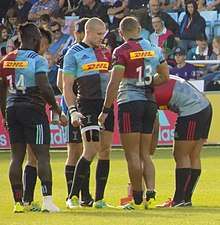
The Harlequins kit is arguably one of the most distinctive in the game, and remained largely unchanged for many years.[21] The kit has always featured a quartered shirt, typically consisting of chocolate brown, French grey, magenta and light blue with black and green sleeves, and most design changes have merely meant changes to the dimensions of the quarters, or the layout of the four main colours.
The current kit, supplied by Adidas, is a return to a more traditional design, after the 2017–18 season's "head to toe suit effect",[22] which saw the four quarters extending over both the shirt and shorts.
In the current version, the four colours are featured only on the shirt, with the presence of black and green minimised, a recurring theme in several of Adidas' previous kits. The rest of the kit was inspired by a 1912 handbook, which noted the club played in midnight blue shorts and socks.[23]
The current away kit has skewed midnight black quarters on the shirt with a green base and grey shorts and socks.
Season summaries
| Premiership | Domestic Cup | Domestic Trophy | European Cup | |||||||
|---|---|---|---|---|---|---|---|---|---|---|
| Season | Competition | Final Position | Points | Play-Offs | Competition | Performance | Competition | Performance | Competition | Performance |
| 1987–88 | Courage League Division 1 | 3rd | 30 | N/A | John Player Cup | Champions | No competition | N/A | No competition | N/A |
| 1988–89 | Courage League Division 1 | 8th | 10 | N/A | Pilkington Cup | Semi-final | No competition | N/A | No competition | N/A |
| 1989–90 | Courage League Division 1 | 7th | 12 | N/A | Pilkington Cup | 3rd round | No competition | N/A | No competition | N/A |
| 1990–91 | Courage League Division 1 | 3rd | 16 | N/A | Pilkington Cup | Champions | No competition | N/A | No competition | N/A |
| 1991–92 | Courage League Division 1 | 8th | 11 | N/A | Pilkington Cup | Runners-up | No competition | N/A | No competition | N/A |
| 1992–93 | Courage League Division 1 | 8th | 11 | N/A | Pilkington Cup | Runners-up | No competition | N/A | No competition | N/A |
| 1993–94 | Courage League Division 1 | 6th | 16 | N/A | Pilkington Cup | Semi-final | No competition | N/A | No competition | N/A |
| 1994–95 | Courage League Division 1 | 8th | 13 | N/A | Pilkington Cup | Semi-final | No competition | N/A | No competition | N/A |
| 1995–96 | Courage League Division 1 | 3rd | 26 | N/A | Pilkington Cup | Quarter-final | No competition | N/A | No English teams | N/A |
| 1996–97 | Courage League Division 1 | 3rd | 30 | N/A | Pilkington Cup | Semi-final | No competition | N/A | Heineken Cup | Quarter-final |
| 1997–98 | Allied Dunbar Premiership | 10th | 16 | N/A | Tetley's Bitter Cup | 4th round | C&G Cup | Not partaken | Heineken Cup | Quarter-final |
| 1998–99 | Allied Dunbar Premiership | 4th | 33 | N/A | Tetley's Bitter Cup | Quarter-final | C&G Cup | Not partaken | No English teams | N/A |
| 1999–00 | Allied Dunbar Premiership | 10th | 18 | N/A | Tetley's Bitter Cup | Quarter-final | No competition | N/A | Heineken Cup | 4th in pool |
| 2000–01 | Zurich Premiership | 11th | 38 | N/A | Tetley's Bitter Cup | Runners-up | No competition | N/A | Challenge Cup | Champions |
| 2001–02 | Zurich Premiership | 9th | 35 | N/A | Powergen Cup | Semi-final | Powergen Shield | Not eligible | Heineken Cup | 3rd in pool |
| 2002–03 | Zurich Premiership | 7th | 44 | - | Powergen Cup | Quarter-final | Powergen Shield | Not eligible | Challenge Cup | 2nd round |
| 2003–04 | Zurich Premiership | 6th | 54 | - | Powergen Cup | 6th round | Powergen Shield | Not eligible | Challenge Cup | Champions |
| 2004–05 | Zurich Premiership | 12th (R) | 38 | - | Powergen Cup | 6th round | Powergen Shield | Not eligible | Heineken Cup | 4th in pool |
| 2005–06 | National Division One | 1st (P) | 121 | N/A | Powergen Cup | Not qualified | EDF Energy Trophy | Champions | Not qualified | N/A |
| 2006–07 | Guinness Premiership | 7th | 51 | - | EDF Energy Cup | 4th in pool | EDF Energy Trophy | Not eligible | Challenge Cup | 2nd in pool |
| 2007–08 | Guinness Premiership | 6th | 63 | - | EDF Energy Cup | 4th in pool | EDF Energy Trophy | Not eligible | Heineken Cup | 4th in pool |
| 2008–09 | Guinness Premiership | 2nd | 66 | Semi-final | EDF Energy Cup | 3rd in pool | EDF Energy Trophy | Not eligible | Heineken Cup | Quarter-final |
| 2009–10 | Guinness Premiership | 8th | 46 | - | LV= Cup | 3rd in pool | British and Irish Cup | Not eligible | Heineken Cup | 4th in pool |
| 2010–11 | Aviva Premiership | 7th | 52 | - | LV= Cup | Semi-final | British and Irish Cup | Not eligible | Challenge Cup | Champions |
| 2011–12 | Aviva Premiership | 1st | 75 | Champions | LV= Cup | 2nd in pool | British and Irish Cup | Not eligible | Challenge Cup* | Quarter-final* |
| 2012–13 | Aviva Premiership | 3rd | 69 | Semi-final | LV= Cup | Champions | British and Irish Cup | Not eligible | Heineken Cup | Quarter-final |
| 2013–14 | Aviva Premiership | 4th | 67 | Semi-final | LV= Cup | 3rd in pool | British and Irish Cup | Not eligible | Challenge Cup* | Semi-final* |
| 2014–15 | Aviva Premiership | 8th | 49 | - | LV= Cup | 2nd in pool | British and Irish Cup | Not eligible | Champions Cup | 3rd in pool |
| 2015–16 | Aviva Premiership | 7th | 55 | - | No competition | N/A | British and Irish Cup | Not eligible | Challenge Cup | Runners-up |
| 2016–17 | Aviva Premiership | 6th | 52 | - | Anglo-Welsh Cup | Semi-final | British and Irish Cup | Not eligible | Challenge Cup | 3rd in pool |
| 2017–18 | Aviva Premiership | 10th | 36 | - | Anglo-Welsh Cup | 2nd in pool | British and Irish Cup | Not eligible | Champions Cup | 4th in pool |
| 2018–19 | Gallagher Premiership | 5th | 56 | - | Premiership Cup | 4th in pool | Championship Cup | Not eligible | Challenge Cup | Semi-final |
Gold background denotes champions
Silver background denotes runners-up
Pink background denotes relegated
* After dropping into the competition from the Champions Cup/Heineken Cup
Club honours
Harlequin F.C.
- English Premiership
- Champions: (1) 2011–12
- RFU Championship
- Champions: (1) 2005–06
- European Challenge Cup
- Anglo-Welsh Cup
- EDF Energy Trophy
- Champions: (1) 2005–06
- Middlesex RFU Senior Cup
- Champions: (1) 1982–83
- Melrose Sevens
- Champions: (2) 1987, 2017[24]
- Kilmarnock Sevens
- Champions: (2) 1984, 1985[25]
Harlequins Reserves
- Premiership Rugby Shield
- Champions: (2) 2003–04, 2012–13
- Runners-up: (3) 2005–06, 2009–10, 2011–12
Harlequin Amateurs
- Herts/Middlesex 3 South
- Champions: (1) 2002–03
- Herts/Middlesex 2 South
- Champions: (2) 2004–05, 2007–08
- MMT Vase
- Champions: (1) 2013–14
- Middlesex Merit 3
- Champions: (1) 2018-19
Friendly
- Middlesex Sevens
- Champions: (14) 1926, 1927, 1928, 1929, 1933, 1935, 1967, 1978, 1986, 1987, 1988, 1989, 1990, 2008
- Glengarth Sevens Davenport Plate
- Champions: (1) 1986
- Cunningham Duncombe Series
- Champions: (2) 2015, 2017
Current squad
The Harlequins squad for the remainder of the 2019–20 season is:[26]
Note: Flags indicate national union as has been defined under WR eligibility rules. Players may hold more than one non-WR nationality.
Academy squad
The Harlequins academy squad is:[27]
Note: Flags indicate national union as has been defined under WR eligibility rules. Players may hold more than one non-WR nationality.
|
|
Club staff
First Team Coaching[28]
| Role | Name |
|---|---|
| Director of Rugby | |
| General manager (Rugby) | |
| Forwards coach | |
| Backs and Attack coach | |
| Line Out coach | |
| Assistant Coach |
Academy[28]
| Role | Name |
|---|---|
| Academy and global development director | |
| Academy head coach | |
| Academy transition coach | |
Notable former players



.svg.png)
.svg.png)
.svg.png)














































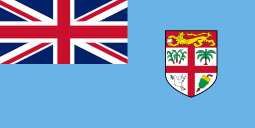







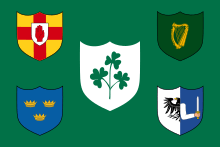









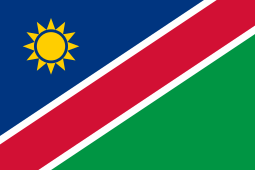




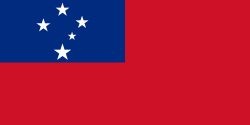















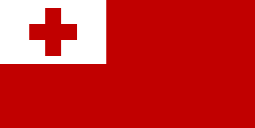

.svg.png)
.svg.png)
.svg.png)
.svg.png)
.svg.png)
.svg.png)
.svg.png)
.svg.png)
See also
- Rugby union in London
- Harlequins Ladies
References
- Paul Rees. "Harlequins 19-18 Stade Français - Amlin Challenge Cup final report". the Guardian.
- "Harlequins Sponsorship". www.quins.co.uk. Retrieved 2 June 2015.
- "Heritage". Harlequins Official Website. Retrieved 2 June 2019.
- "Harlequins launches 150th season and new kit". 1 July 2016.
- Dallaglio, Lawrence (29 November 2009). "Dallaglio's Rugby Tales". Headline – via Google Books.
- Cleary, Mick (20 May 2011). "Harlequins 19 Stade Francais 18". Daily Telegraph. London. Retrieved 24 May 2011.
- Rees, Paul (20 May 2011). "Harlequins 19 Stade Francais 18". Guardian. London. Retrieved 24 May 2011.
- Averis, Mike (12 May 2012). "Harlequins 25–23 Northampton". The Guardian. London.
- "AVIVA PREMIERSHIP - 2014-15". quins.co.uk. Retrieved 20 January 2016.
- "Ben Botica's boot helps Harlequins end 14-man Saracens' winning run". guardian.co.uk. Retrieved 20 January 2016.
- "European Challenge Cup: Harlequins 34-26 Cardiff Blues". bbc.co.uk. Retrieved 20 January 2016.
- "Stadium". quins.co.uk.
- "Harlequins Foundation using high-profile rugby club to raise awareness of mental health". SWLondoner. Retrieved 24 April 2019.
- "Quins + Movember in Mental Health Drive". Sport Industry Group. 12 September 2018. Retrieved 2 June 2019.
- "Rugby club now licensed to deliver The Duke of Edinburgh's Award". Charity Today. Retrieved 17 June 2020.
- AFP Quins escape further action in bloodgate scandal. Retrieved 25 August 2009.
- Harlequins have let down all of rugby, Chris Roycroft-Davis, The Times, 18 August 2009
- Quins chairman falls on his sword over 'Bloodgate' The Independent, 29 August 2009
- 'Bloodgate' doctor given a warning by GMC BBC News, 16 September 2009
- "Harlequins avoid ban from Europe". BBC Sport. 2 September 2009. Retrieved 2 September 2009.
- Rees, Paul (31 July 2007). "Rugby union: No quarter given as Harlequins are forced into a change of shirt". The Guardian.
- "Harlequins and Adidas launch the 2017/18 kits". 21 July 2017.
- "Harlequins launch 2018/19 Home and Away kits". www.quins.us.
- "Melrose Sevens". 7 June 2019.
- "Kilmarnock Sevens". 7 June 2019.
- "Current Players". Harlequins. Retrieved 7 July 2019.
- "Current Players". Harlequins. Retrieved 7 July 2019.
- "Harlequins Coaching Staff". quins.co.uk. Retrieved 4 June 2019.